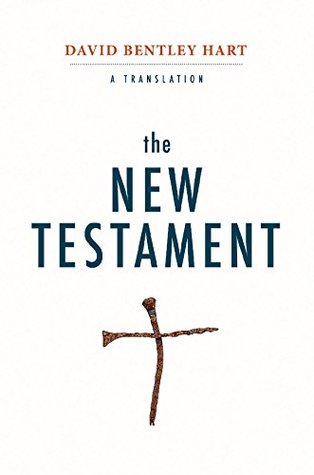More on this book
Community
Kindle Notes & Highlights
Copyright © 2017
Purchased March 2018, read large portions that spring and summer with Bishop Dorsey McConnell’s bible study, and more in the Spring of 2020 with EfM.
How does he decide paragraphing? And even sentence endings and capitalizations in mid-"sentence"?
See also his The Story of Christianity
Words and concepts, p. 536 ff.
Hebrew scripture quotations in the N.T.
Romans 2:24, 3:4, 3:10-18 (five sources), 4:3, 4:7-8, 4:17, 18, 8:36, 9:7, 9, 12, 13, 25, 26, 27, 29, 33, 10:5, 6-8, 11, 13, 15, 16, 18, 19, 20, 21, 11:3, 4, 8, 9-10, 26, 34, 35, 13:9, 10, 14:11, 15:3, 9, 10, 11, 12, 15:21,
modern demotic.
the accent invented by sixteenth-century Western European humanists,
Erasmian Greek.
the diphthong omicron-iota
omicron,
I have also made the “h” that represents the hard breathing mark over certain vowels a superscript,
I have similarly made the iota-subscript of singular datives into a subscript in English also.
I have, however, also resorted to copious dashes and parentheses and other devices to break up the unbroken flow of his often deeply tangled sentences into discrete intelligible phrases and clauses,
have, however, also resorted to copious dashes and parentheses and other devices to break up the unbroken flow of his often deeply tangled sentences into discrete intelligible phrases and clauses,
their often insufferably prolonged periods
the personal pronouns that vie wildly with one another in verse after verse;
where there are sudden shifts of tense in the original Greek, my English usually follows suit.
lapsing naturally into the present tense at critical moments, then withdrawing into the past again.
Part of the task of illuminating the original text for Anglophone readers raised on the standard translations is, as I say, to give them a sense of the strangeness of the text: the novelty, the impenetrability, the frequently unfinished quality of the prose and of the theology.
the special amphibology of Christian scripture.
a kind of wildly indiscriminate polyphony,
the vibrant certainty that history has been invaded by God in Christ in such a way that nothing can stay as it was, and that all terms of human community and conduct have been altered at the deepest of levels.
how stark the dualism really is, in Paul’s letters and elsewhere in the New Testament, between “flesh” and “spirit,”
how greatly formulations that seem to imply universal salvation outnumber those very few that appear (and rather nebulously) to threaten an ultimate damnation for the wicked,
its strangeness in respect to the Christianity of later centuries.
just a bit indecent.
one thing in startlingly short supply in the New Testament is common sense,
the New Testament, alarmingly enough, condemns personal wealth not merely as a moral danger, but as an intrinsic evil.
Christ’s (and Paul’s and James’s) condemnations of the wealthy and acquisitive.
the spiritual complacency that a culture of increasing material security dearly required of its religion.
Grace had set humanity free not only from works of the Law, but also from the spiritual agony of seeking to become holy by moral deeds.
the moral heroism of the everyday.
The New Testament emerges from a cosmos ruled by malign celestial principalities (conquered by Christ but powerful to the end) and torn between spirit and flesh (the one, according to Paul, longing for God, the other opposing him utterly). There are no comfortable medians in these latitudes, no areas of shade. Everything is cast in the harsh light of a final judgment that is both absolute and terrifyingly imminent. In regard to all these texts, the qualified, moderate, commonsense interpretation is always false.
It also tells them that all who seek wealth—not simply all who procure it unjustly—have ensnared themselves in desires that will lead to their ruin:
(A property that is koinōnikon is something held in common or corporately, and therefore a person who is koinōnikos is certainly not just someone who occasionally makes donations at his own discretion.)
The Didache,
Throughout the history of the church, Christians have keenly desired to believe that the New Testament affirms the kind of people they are, rather than—as is actually the case—the kind of people they are not, and really would not want to be.
36But I tell you that every idle word that men will speak, they will render an account of it on the day of judgment;
the powers of the heavens
but some doubted.
“son of man” is simply a good Semitic idiom meaning “a man,”
as Christ uses it in the Gospels it should clearly be read as a distinctive (if mysterious) prophetic title.
Classically, the word was distinguished (by Aristotle, for instance) from τιμωρία (timōria), which means a retributive punishment only.
the only other use of the noun in the New Testament is in 1 John 4:18, where it refers not to retributive punishment, but to the suffering experienced by someone who is subject to fear because not yet perfected in charity.
a baptism of the heart’s transformation,
he made his proclamation,
he will baptize you by a Holy Spirit.”
the Kingdom of God has drawn near; change your hearts and have faith in the good tidings.”
did not allow the demons to speak, because they recognized him.
gouged out an opening,
Son of Man


